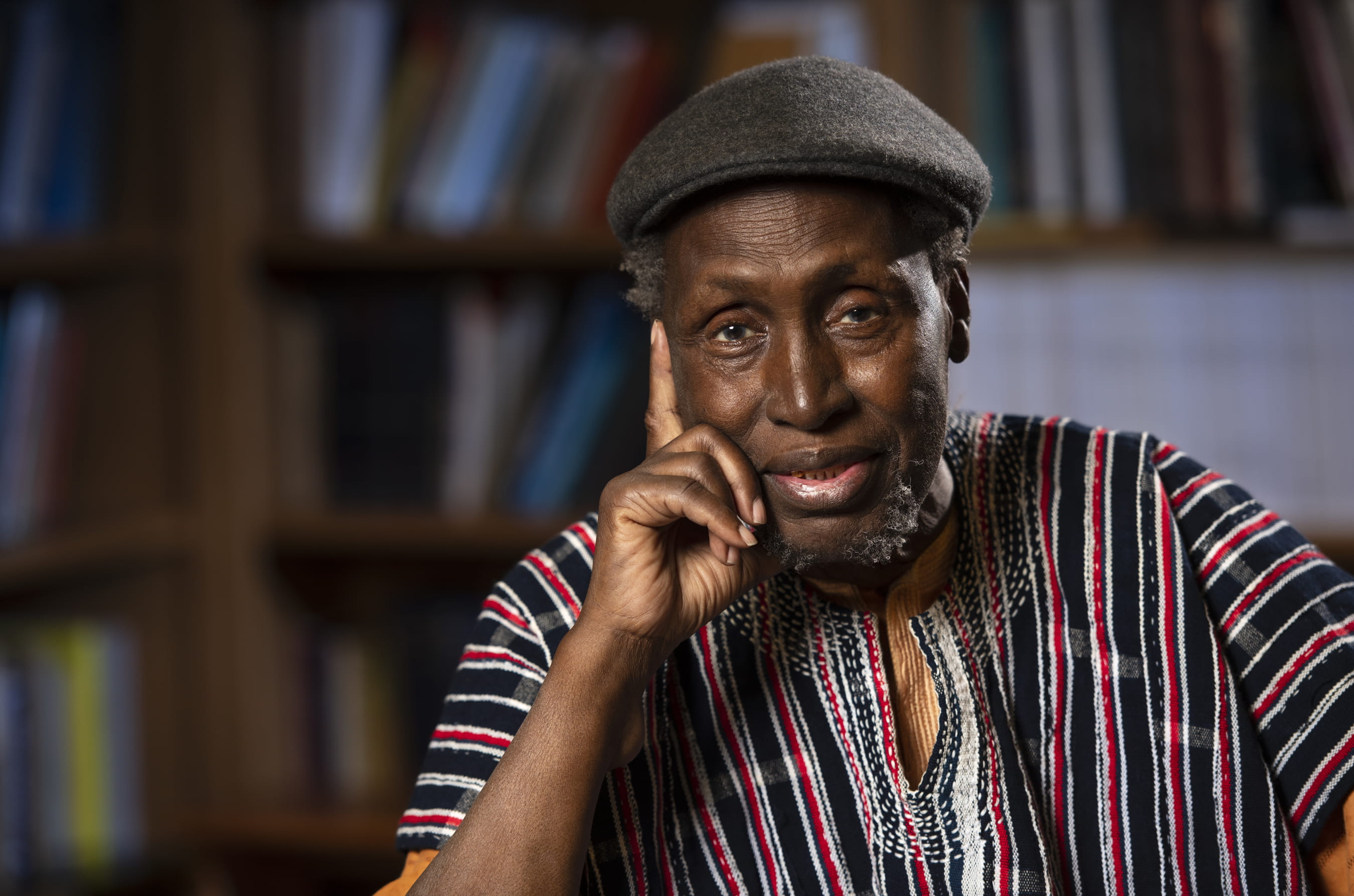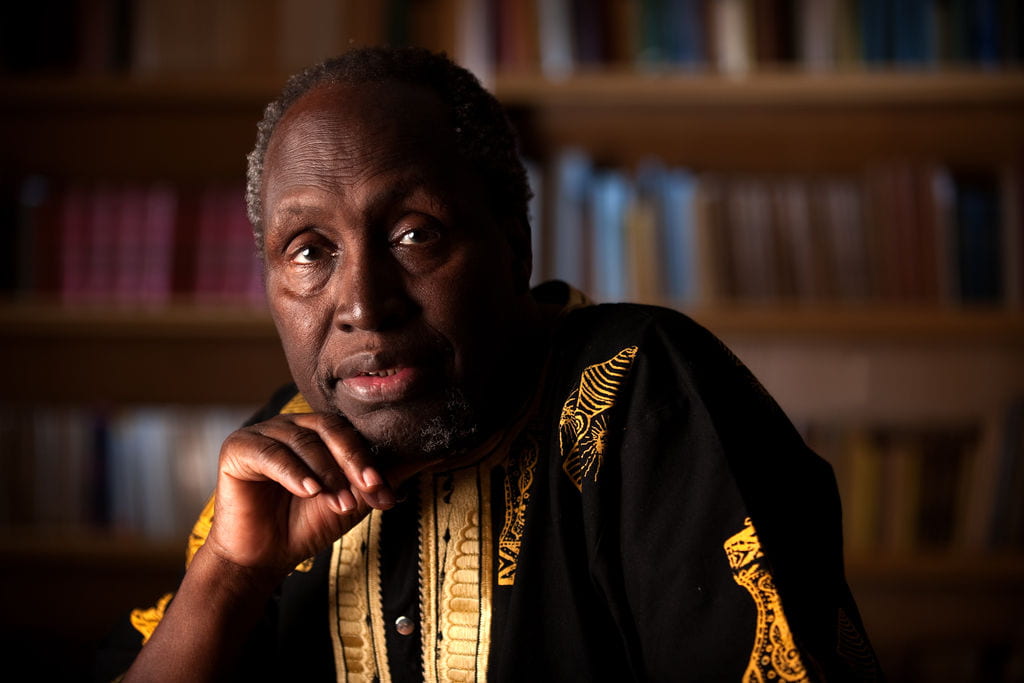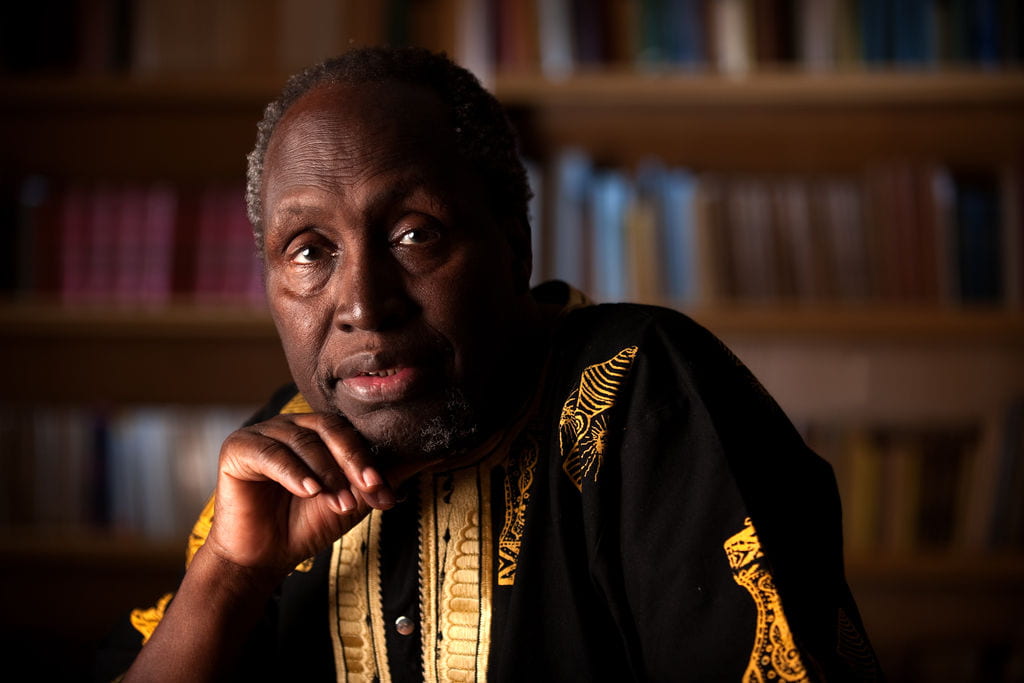Global conversation
African author Ngugi wa Thiong’o champions diversity in literature and culture
Kenyan writer Ngugi wa Thiong’o describes in his book,Decolonising the Mind, what happened to students caught speaking their native Gikuyu at school: “The culprit was given corporal punishment – three to five strokes of the cane on bare buttocks – or was made to carry a metal plate around the neck with inscriptions such as ‘I Am Stupid’ or ‘I Am a Donkey.’”
The tactic worked. Ngugi wa Thiong’o became fluent in English and grew up to become one of Africa’s greatest writers. But not without scars that have made him question that practice and its effect on the psyche of a community and the continent. He now writes, by choice, in Gikuyu.
Language, he believes, carries culture. When the language dies, the culture dies. Moreover, each language makes its own, unique contributions to the intellectual wealth of humankind.
To UCI humanities Dean Karen Lawrence, Ngugi’s background and passions, his own lifework, made him the ideal person to lead UCI’s new International Center for Writing and Translation. “His whole life has led him to be the perfect director of the center,” Lawrence says. Ngugi was named director of the center, as well as Distinguished Professor of English and Comparative Literature in the School of Humanities, in July 2002.
What persuaded him to come to UCI, Ngugi says, was the perfect fit between his own goals and those of the center. “It was the opportunity to come and direct a center whose concerns contribute meaningfully to the global conversation,” he says.
A MAN OF LETTERS
Ngugi, whose name means “work” and is pronounced “Googy,” was born in 1938 into a family of four wives and 28 children inLimuru, Kenya. Receiving his undergraduate degree in Uganda, he wrote novels and plays while moving up through academic ranks to become chair of the Department of Literature at theUniversity of Nairobi in Kenya.
In 1977, a play he had written and produced was shut down by the Kenyan government and Ngugi himself was thrown into prison, where he remained throughout 1978. While there, he continued to write on the only paper available – toilet paper – reflections that later became the prison diary Detained, and a novel, a farce about thieves arguing over who could best steal from the people. He was released only after Amnesty International had identified him as a “prisoner of conscience” and conducted a worldwide campaign on his behalf. He left Kenya in 1982, and has worked since 1989 in American universities, first Yale, and then New York University.
FORGING NEW DIRECTIONS
Lawrence says that when Ngugi agreed in 2002 to become its director, the fledgling center existed as a concept that had evolved from discussions with humanities faculty, and UCI alumnus and Las Vegas businessman Glenn Schaeffer. Ngugi “shaped those original conceptions in ways that we couldn’t have anticipated,” she says, “which is what you want when you find an exciting director.”
With an executive board listing such literary luminaries as Jacques Derrida, Bei Ling, Mark Strand and Wole Soyinka, the center fosters writing, translation and criticism in multilingual and international contexts. It offers fellowships to students in doctoral emphases in translation studies and creative nonfiction in the departments of English and Comparative Literature, and History. It hosts events with distinguished writers, scholars and performers, and provides grants to UCI students and faculty, and to individual translators across the globe.
The center hosts two scholarly series each year. The first, “From Here to There: Languages in Conversation,” invites writers, scholars and performers to discuss why they write in the language they choose and the implications of that choice. “Other Ways of Knowing: The Challenge of Cultures in Contact” invites distinguished guests to UCI to explore broadened notions of cultural translation.
Such presentations have been startlingly successful, Ngugi says. “From our first seminar, ‘Indigenous Voices in North American Culture,’ the attendance has been incredible. We’ve had Africans coming to campus from the community, Chicanos, Hawaiians, Native Americans, as well as UCI students. To see them in communication with the faculty here is very moving.”
Recently returned from South Africa, where he presented the prestigious Steve Biko Lecture at the University of Cape Town, Ngugi sees parallels between his own colonial past and a future in which globalized commerce threatens to overwhelm indigenous cultures.
“That’s one of the challenges that brought me here,” he says. “The center is much more than another academic site. It can contribute in its own way to resolving the contradictions of globalization.
“The center is creating a venue for global conversation among languages,” he adds. “It is a privilege to play a part in this evolution.”


